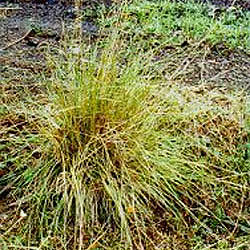
Chilean Needle Grass. Photo: Dept. of Agriculture, Victoria
Weed control program starts
Friday, October 11, 2019
Conditions are ripe for weeds to grow and spread, says Murrindindi Shire Council.
The Council will be kicking off its weed control program in the coming weeks, with contractors set to spray many roadsides for Chilean Needle Grass, Blackberry, Broom, St John’s Wort, Gorse, Paterson’s Curse and Sweet Briar.
Environment Portfolio Councillor, Bec Bowles, said part of the problem is that weeds don’t respect property boundaries.
“It’s absolutely essential landowners take action on their own property to prevent the spread of weeds. Especially those weeds which present a really high risk to livestock, pastures and the environment,” Cr Bowles said.
“Chilean Needle Grass, sometimes mistaken for other native spear grasses, is a prime example of a ‘high-risk’ weed. The grass can severely reduce pasture productivity and contaminate hay. Its needle-like seed can injure both stock and other animals by burrowing into their mouths, hides and fleeces.
“This grass has earned its classification as a ‘Weed of National Significance’ because of its ability to spread quickly and out-compete pasture and native grasses. It poses potentially disastrous economic and environmental impacts.
“For the past five years, Council has collaborated with Regional Roads Victoria, to spray highways around the Shire for Chilean Needle Grass. This year, RRV will be spraying along the Goulburn Valley Hwyy from Molesworth to Dairy Creek Rd, the Melba Highway from Yea to Langs Rd and Yea-Whittlesea Rd from Yea to Deepdene Rd. We will be treating Council-managed roadsides for the Grass in these areas as well.
“We’re really concerned about the presence of this grass in the Shire and are calling on all landowners to keep their eyes peeled and act immediately if they discover an infestation on their property.
“Spring is a good time to identify Chilean Needle Grass as it’s in flower. Unfortunately though, because seeds are produced in three sites on this grass, slashing alone won’t adequately control it. An integrated approach, which includes some chemical control, is most likely to deliver a good result.
“Given the weed’s ability to create persistent seed, we need to act quickly and collectively to eradicate any small, newly-established infestations of Chilean Needle Grass,” Cr Bowles said.
For more information about Chilean Needle Grass or Council’s forthcoming weed control program, see
www.murrindindi.vic.gov.au/weedmanagement

